Unit 2 Neighbours Welcome to the unit课件2021-2022学年牛津译林版英语七年级下册(共24张PPT)
文档属性
| 名称 | Unit 2 Neighbours Welcome to the unit课件2021-2022学年牛津译林版英语七年级下册(共24张PPT) |

|
|
| 格式 | zip | ||
| 文件大小 | 2.1MB | ||
| 资源类型 | 教案 | ||
| 版本资源 | 牛津译林版 | ||
| 科目 | 英语 | ||
| 更新时间 | 2022-02-09 00:00:00 | ||
图片预览

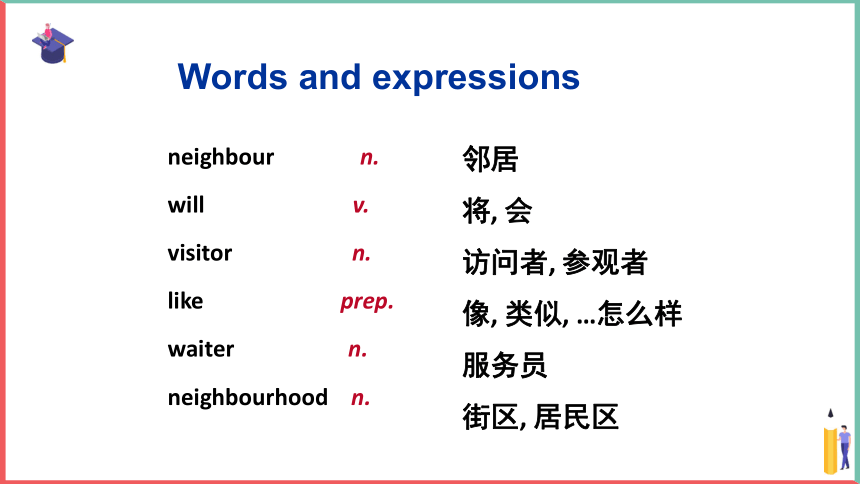
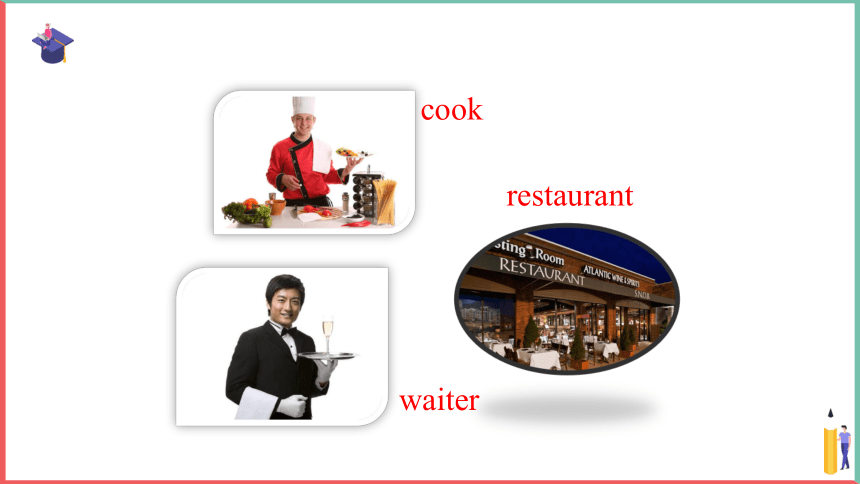

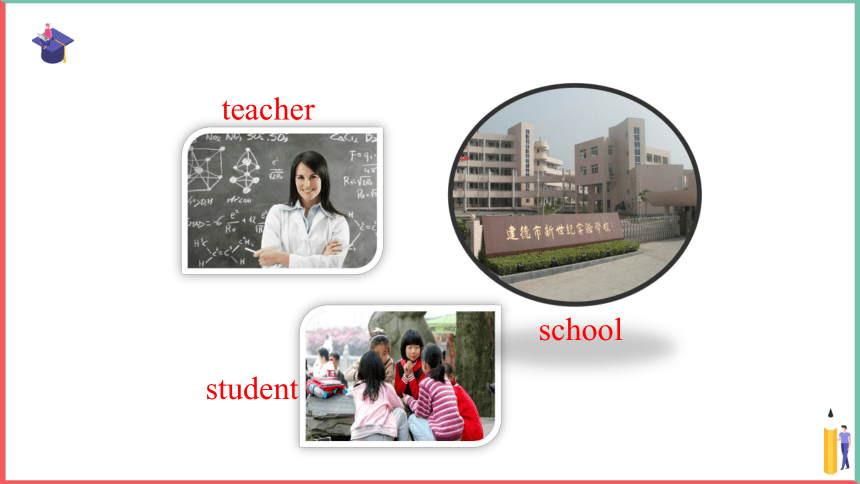
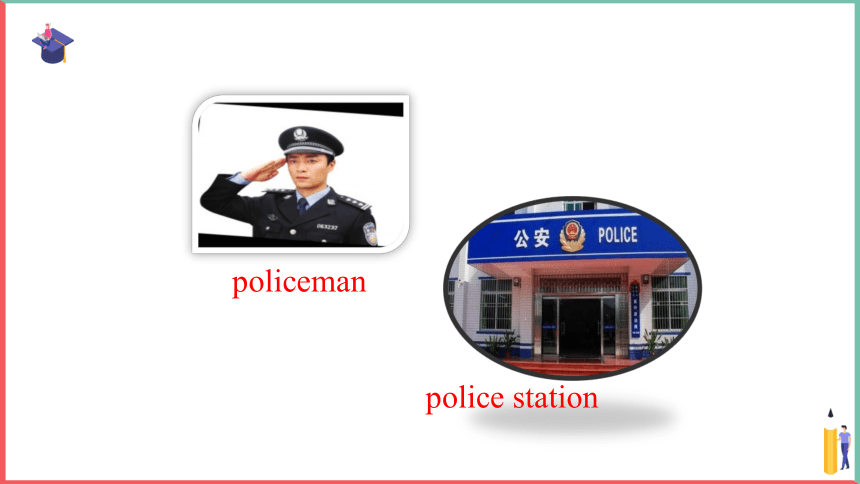
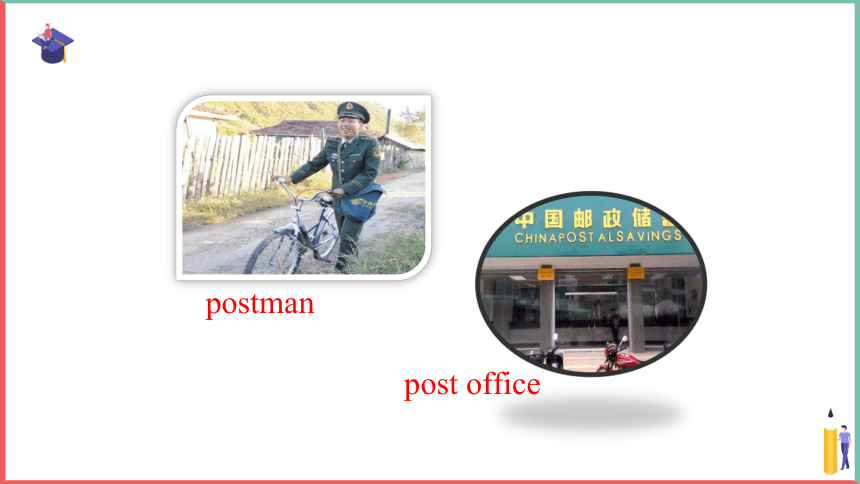
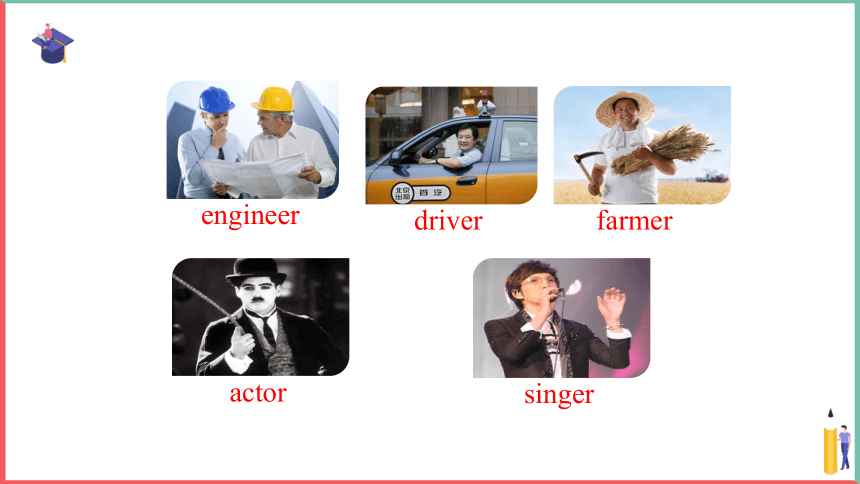
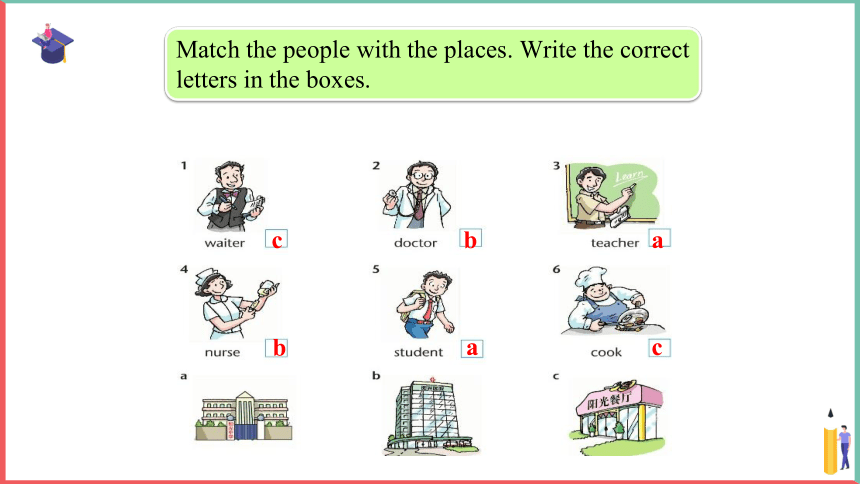
文档简介
(共24张PPT)
Unit2 Neighbours
Welcome to the unit
Words and expressions
neighbour n.
will v.
visitor n.
like prep.
waiter n.
neighbourhood n.
邻居
将, 会
访问者, 参观者
像, 类似, …怎么样
服务员
街区, 居民区
cook
restaurant
waiter
doctor
nurse
hospital
teacher
student
school
policeman
police station
postman
post office
engineer
driver
farmer
actor
singer
People and places
Match the people with the places. Write the correct
letters in the boxes.
c
b
a
b
a
c
1. Where’s Simion’s flat
It’s in City Garden in Ninth Street.
Most of them have 14 floors.
Supermarkets, restaurants, a school and a hospital.
He thinks it’s good to live in a neighbourhood like that.
3. What does Simon have around his neighbourhood
4. What does Simon think of his neighbourhood
2. How many floor do the buildings have
1. I live in a flat in City Garden in Ninth
Street.
live in 表示“住在……的地方;住在(某 地); 存在于…”。
e.g. My grandparents live in shanghai.
我的祖父母居住在上海。
in the street (BE) = on the street (AM)
2. How many buildings are there in your neighbourhood
how many + 可数名词复数
how much + 不可数名词,二者都是对数量的询问。
e.g.: How many apples on the table
桌子上有多少苹果?
How much milk in the bottle
瓶子里有多少牛奶?
4.Most of them have 14 floors.大多数楼有14层。
most的用法
表示“数量上最多,最大”,为many或much 的最高级。
例: She had the most books of all of them.在这些人中,她有最多的书。
most of + the/this/these/that/those/物主代词+名词,指某一范围内的多数。(名词前面一定要有修饰词)
例:Most of the people come from China. most of my friends
most of +可数名词复数+ V复 most of +不可数名词+V单
④most 与 most of 的区别
1 most+名词 表泛指,无范围 如: most young people
II most of + 名词 指某一范围的多数
III most of +人称代词,of 不能少 如: most of them
两者有时可互换: Most teachers in this school are women.
= Most of the teachers in this school are women.
5.It’s good to live in a neighbourhood like that.住在像那样的社区是好的,
It is +adj +to do sth.做某事怎么样? 句中it is 作形式主语,to do 做句子的真正主语。
It is +adj for sb +to do sth.对某人来说做某事怎么样?
It is +adj of sb +to do sth.对某人来说做某事怎么样?
Where are you going
I am going to visit our new neighbours.
Work in pairs and act it out
1
2
3
4
1. Where are you going 你要到哪儿去?
可以用进行时态来表示将来的动作。
如:He is going to Paris.他要去巴黎了。
[拓展]
类似的词还有come,go,leave,move等。如:
Look! The bus is coming.看!公共汽车就快来了。
I’m leaving. Bye !我要走了,再见。
We’re moving to Beijing.我们就要搬到北京去了。
Language Points
1. I’m going to visit our new neighbours.
I’ll meet them, too.
be going to do sth. 和 will do sth. 都是一般
将来时态的动词结构。前者的be动词需要
依据句子主语的人称或单复数来确定am,
is或are, 而后者的will则不需要变化。
e.g. Students are going to go for a school trip
next Sunday.
It will rain tomorrow.
2. I’m afraid they won’t welcome visitors like
you. 我恐怕他们不欢迎像你这样的客人吧。
1) be afraid to do sth./
be afraid of (doing) sth. /
be afraid (that) +句子 “害怕……”
afraid 在这里作表语, 它有“害怕, 担心……,
恐怕……”等意思。
e.g. I am afraid of snakes.
He is afraid of going out at night.
I’m afraid that I can’t help you.
Don’t be afraid.
2) won’t welcome
此处的won’t = will not, 是其缩写形式。
<拓展>
一般将来时态的否定形式的动词结构:
am/is/are not going to do sth.
e.g. I am not going to go to Beijing next week.
下周我不去北京了。
will not do sth. = won’t do sth.
e.g. You won’t be much better.
你已经非常好了。
单项选择
1.( ) Bill,___most of the boys ,___model cars
very much.
A likes; like B like ;likes
C likes ;likes D like;like
2.( )Would you please ask him ____late for the
meeting this afternoon.
A don’t B not to be C not be D aren’t be
3.( )Nanjing is _____ big and beautiful city.
It is ____ capital of Jiangsu.
A a,a B the ,a C. a ,the D the ,the
4.( )—Shall we ____after dinner — Good idea.
A go for a walk B going for a walk
C to go swimming D swimming
THANKS
Unit2 Neighbours
Welcome to the unit
Words and expressions
neighbour n.
will v.
visitor n.
like prep.
waiter n.
neighbourhood n.
邻居
将, 会
访问者, 参观者
像, 类似, …怎么样
服务员
街区, 居民区
cook
restaurant
waiter
doctor
nurse
hospital
teacher
student
school
policeman
police station
postman
post office
engineer
driver
farmer
actor
singer
People and places
Match the people with the places. Write the correct
letters in the boxes.
c
b
a
b
a
c
1. Where’s Simion’s flat
It’s in City Garden in Ninth Street.
Most of them have 14 floors.
Supermarkets, restaurants, a school and a hospital.
He thinks it’s good to live in a neighbourhood like that.
3. What does Simon have around his neighbourhood
4. What does Simon think of his neighbourhood
2. How many floor do the buildings have
1. I live in a flat in City Garden in Ninth
Street.
live in 表示“住在……的地方;住在(某 地); 存在于…”。
e.g. My grandparents live in shanghai.
我的祖父母居住在上海。
in the street (BE) = on the street (AM)
2. How many buildings are there in your neighbourhood
how many + 可数名词复数
how much + 不可数名词,二者都是对数量的询问。
e.g.: How many apples on the table
桌子上有多少苹果?
How much milk in the bottle
瓶子里有多少牛奶?
4.Most of them have 14 floors.大多数楼有14层。
most的用法
表示“数量上最多,最大”,为many或much 的最高级。
例: She had the most books of all of them.在这些人中,她有最多的书。
most of + the/this/these/that/those/物主代词+名词,指某一范围内的多数。(名词前面一定要有修饰词)
例:Most of the people come from China. most of my friends
most of +可数名词复数+ V复 most of +不可数名词+V单
④most 与 most of 的区别
1 most+名词 表泛指,无范围 如: most young people
II most of + 名词 指某一范围的多数
III most of +人称代词,of 不能少 如: most of them
两者有时可互换: Most teachers in this school are women.
= Most of the teachers in this school are women.
5.It’s good to live in a neighbourhood like that.住在像那样的社区是好的,
It is +adj +to do sth.做某事怎么样? 句中it is 作形式主语,to do 做句子的真正主语。
It is +adj for sb +to do sth.对某人来说做某事怎么样?
It is +adj of sb +to do sth.对某人来说做某事怎么样?
Where are you going
I am going to visit our new neighbours.
Work in pairs and act it out
1
2
3
4
1. Where are you going 你要到哪儿去?
可以用进行时态来表示将来的动作。
如:He is going to Paris.他要去巴黎了。
[拓展]
类似的词还有come,go,leave,move等。如:
Look! The bus is coming.看!公共汽车就快来了。
I’m leaving. Bye !我要走了,再见。
We’re moving to Beijing.我们就要搬到北京去了。
Language Points
1. I’m going to visit our new neighbours.
I’ll meet them, too.
be going to do sth. 和 will do sth. 都是一般
将来时态的动词结构。前者的be动词需要
依据句子主语的人称或单复数来确定am,
is或are, 而后者的will则不需要变化。
e.g. Students are going to go for a school trip
next Sunday.
It will rain tomorrow.
2. I’m afraid they won’t welcome visitors like
you. 我恐怕他们不欢迎像你这样的客人吧。
1) be afraid to do sth./
be afraid of (doing) sth. /
be afraid (that) +句子 “害怕……”
afraid 在这里作表语, 它有“害怕, 担心……,
恐怕……”等意思。
e.g. I am afraid of snakes.
He is afraid of going out at night.
I’m afraid that I can’t help you.
Don’t be afraid.
2) won’t welcome
此处的won’t = will not, 是其缩写形式。
<拓展>
一般将来时态的否定形式的动词结构:
am/is/are not going to do sth.
e.g. I am not going to go to Beijing next week.
下周我不去北京了。
will not do sth. = won’t do sth.
e.g. You won’t be much better.
你已经非常好了。
单项选择
1.( ) Bill,___most of the boys ,___model cars
very much.
A likes; like B like ;likes
C likes ;likes D like;like
2.( )Would you please ask him ____late for the
meeting this afternoon.
A don’t B not to be C not be D aren’t be
3.( )Nanjing is _____ big and beautiful city.
It is ____ capital of Jiangsu.
A a,a B the ,a C. a ,the D the ,the
4.( )—Shall we ____after dinner — Good idea.
A go for a walk B going for a walk
C to go swimming D swimming
THANKS
